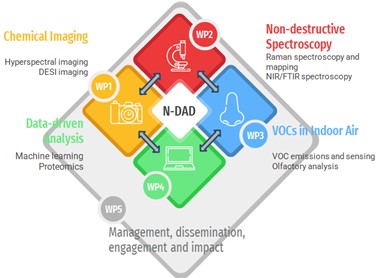The Programme Group N-DAD addresses key challenges in analytical chemistry, such as non-destructive spatially resolved analysis and data-driven diagnostics, delivering knowledge and skills for the chemical, engineering and related sectors where clear gaps have been identified. By (i) focussing on analytical problems associated with extreme compositional and structural complexity, whether in materials research, environment, food industry, pharmaceuticals or cultural heritage, (ii) working in partnership with numerous world-leading institutions, and (iii) aligning with the needs of European Research Infrastructures, N-DAD will represent a powerhouse of research and impact in analytical chemistry in and far beyond Slovenia.

N-DAD responds to four key analytical challenges identified as an urgent need, based on the recognised gaps, team track record and expertise, and available research infrastructure. The Challenges translate into four interdependent work-packages:
- Challenge 1: Chemical imaging. Referring predominantly to the microscale, of interest are distributions of compounds on material surfaces, obtained using optical imaging spectroscopy or mass spectroscopy following DESI imaging. In both cases, complex data cubes require computationally intensive analysis (Challenge 4).
- Challenge 2: Non-destructive spectroscopy. The focus is on potentially mobile surface techniques, e.g. Raman, FTR and NIR spectroscopy, of diverse spatial and depth resolutions, enabling fast data collection also in non-laboratory environments, e.g. for citizen science . These enable rapid data collection ideal for data-intensive analysis (Challenge 4) or for analytical spectral interpretation. Raman mapping remains little explored in studies of dynamic surface processes.
- Challenge 3: VOCs in indoor air. Sampling and characterisation of VOCs for the purpose of identification and quantification is well-established, however, significant gaps exist in characterisation of interactions with materials and in terms of olfactory characterisation, which is what N-DAD will specialise in, using olfactory detection . VOCs as markers of degradation often require data-intensive analytical methods (Challenge 4), like -omics approaches in other fields.
- Challenge 4: Data-driven analysis. Most of the above techniques enable rapid data acquisition either in imaging or spot-analytical modes, and data cleaning, variable selection, classification and discrimination, multivariate calibration require complex machine learning algorithms . Method optimisation using these on complex 3D datasets is not straightforward and requires significant resources and research.
Our research has been aligned with key international institutions, e.g. the MIT (USA), CNR (Italy), Fraunhofer (Germany), UCL (UK), ETH (Switzerland), Universite Cergy Paris (France) and many more, in order to jointly ensure exceptional impact.
As N-DAD research is fundamental in nature, the deliverables are predominantly academic. However, N-DAD will also support the delivery of the Slovenian node of E-RIHS, the European Research Infrastructure for Heritage Science.
N-DAD (P1-0447) is funded through the Stable Funding Pillar at the University of Ljubljana, by the Slovenian Research and Innovation Agency (€150k annually).
Scientific impact:
- PAOLIN Emma, BEMBIBRE Cecilia, DI GIANVINCENZO Fabiana, CESAR TORRES-ELGUERA Julio, DERAZ Randa, KRAŠEVEC Ida, ABDELLAH Ahmed, AHMED Asmaa, KRALJ CIGIĆ Irena, ELNAGGAR Abdelrazek, ABDELHALIM Ali, SAWOSZCZUK Tomasz, STRLIČ Matija. A multidisciplinary approach combining sensory and TD-GC-MS-O analysis to characterise the smell of ancient Egyptian mummified bodies: [keynote lecture]. 7th International Congress on Chemistry for Cultural Heritage: ChemCH [Internet]. 2024;97–98. https://chemch2024.educell.sk/wp-Content/uploads/2024/06/Proceedings_ChemCH2024.pdf [COBISS.SI-ID 202237699]
- STRLIČ Matija, HOHNEC Tanja, ČREŠNAR Matija. Pred točko preloma?: dediščinska znanost in podnebna kriza: televizijska pogovorna oddaja (Spre)govori znanost, AKTV, 29. 5. 2024 (D. Jontes, Ur.). AKTV – 23.5.2024 – AKTV – Akademska televizija [COBISS.SI-ID 197400835]
